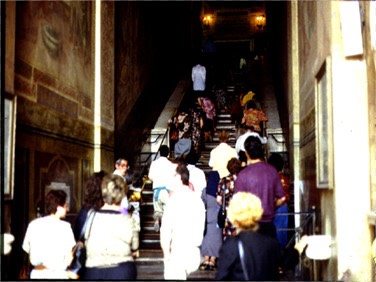Indulgences

Catholicism teaches that you can be forgiven in advance for your sins—even to this day. This is the staircase that Catholicism claims Jesus stood on when He was condemned by Pilate. There are supposedly drops of Jesus' blood still on the staircase. People can crawl up the staircase, and wherever the drops of blood fell there is a plaque. If you kiss the places where the drops of blood supposedly fell, you get 90 days absolution.
According to Rome, this staircase was in Jerusalem originally. But Rome claims that one night it was transported by angels from Jerusalem to Rome, so the Catholics built a cathedral around it.
"Indulgence" is a Roman Catholic term that is not found in the Bible. The Vatican defines an indulgence as "the taking away of the temporal punishment due to sin."i
The Roman Catholic Church defines "temporal punishment" as suffering in the fires of purgatory for venial (lesser) sins. According to the Catholic Church, mortal sin is sin only Jesus can pay for. Venial sins are lesser sins we must pay for in purgatory as a means of purification before we can enter heaven.
Through performing certain rituals or works according to specific Vatican rules, and paying money, a Catholic may obtain an indulgence to shorten the time spent in purgatory. The amount of temporal punishment that is taken away is determined by the value of the act.ii According to the Catholic Church, the primary purpose for granting indulgences is to "help the faithful expiate their sins."iii
The Pope is said to have the authority to give these indulgences to Catholics from a treasury of merit. This invisible treasury contains the infinite merits of Christ, as well as the merits of Mary and the saints. According to Catholic catechism, Catholics can attain "their own salvation and at the same time cooperate in saving their brothers."iv
History of Indulgences
This tradition began in the Middle Ages when Pope Urban II promised a plenary indulgence to anyone who would participate in the Crusades. At first, only the sins of the living could be taken away, but in 1477 Pope Sixtus IV declared they could be applied to the souls in purgatory as well.
Revenues from the sale of indulgences helped finance the construction of St. Peter's Basilica in Rome. This public selling of indulgences outraged Martin Luther and sparked the Reformation in 1517. As the use of indulgences spread, there were many abuses including the "collection of unlawful profits which blasphemously took away the good name of indulgences."v As a result, Vatican Council II had to set up twenty new rules for granting indulgences, such as rule 17:
The faithful who use with devotion an object of piety (crucifix, cross, rosary, scapular, or medal) after it has been duly blessed by any priest, can gain a partial indulgence. But, if this object of piety is blessed by the Pope or any bishop, the faithful who use it with devotion can also gain a plenary indulgence on the feast of the Apostle Peter and Paul, provided they make a confession of faith using any approved formula.vi
The Roman Catholic Church takes indulgences very seriously:
Since the power of granting indulgences was conferred by Christ on the Church...it condemns with anathema those who assert that they are useless or deny that there is in the Church the power of granting them.vii
Indulgences are played down by some Catholics, but the practice is still occurring. Read about indulgences in a popular Catholic encyclopedia, find out what Pope Benedict XVI has to say about indulgences, or learn about special indulgences given to priests at the Vatican.